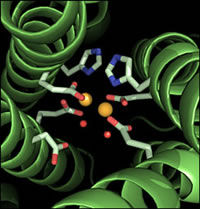Substance in breast milk kills cancer cells
Advertisement
A substance found in breast milk can kill cancer cells, reveal studies carried out by researchers at Lund University and the University of Gothenburg, Sweden. Although the special substance, known as HAMLET (Human Alpha-lactalbumin Made LEthal to Tumour cells), was discovered in breast milk several years ago, it is only now that it has been possible to test it on humans. Patients with cancer of the bladder who were treated with the substance excreted dead cancer cells in their urine after each treatment, which has given rise to hopes that it can be developed into medication for cancer care in the future.
HAMLET was discovered by chance when researchers were studying the antibacterial properties of breast milk. Further studies showed that HAMLET comprises a protein and a fatty acid that are both found naturally in breast milk. So far, however, it has not been proven that the HAMLET complex is spontaneously formed in the milk. It is speculated, however, that HAMLET can form in the acidic environment of the babies´ stomachs. Laboratory experiments have shown that HAMLET kills 40 different types of cancer, and the researchers are now going on to study its effect on skin cancer, tumours in the mucous membranes and brain tumours. Importantly, HAMLET kills only cancer cells and does not affect healthy cells.
Researchers at the University of Gothenburg are focusing on how HAMLET can be taken up into tumour cells. The researchers, Roger Karlsson, Maja Puchades and Ingela Lanekoff, are attempting to gain an in-depth understanding of how the substance interacts with cell membranes, and their findings were recently published in PLoS One .
Organizations
Other news from the department science

Get the life science industry in your inbox
By submitting this form you agree that LUMITOS AG will send you the newsletter(s) selected above by email. Your data will not be passed on to third parties. Your data will be stored and processed in accordance with our data protection regulations. LUMITOS may contact you by email for the purpose of advertising or market and opinion surveys. You can revoke your consent at any time without giving reasons to LUMITOS AG, Ernst-Augustin-Str. 2, 12489 Berlin, Germany or by e-mail at revoke@lumitos.com with effect for the future. In addition, each email contains a link to unsubscribe from the corresponding newsletter.

























































